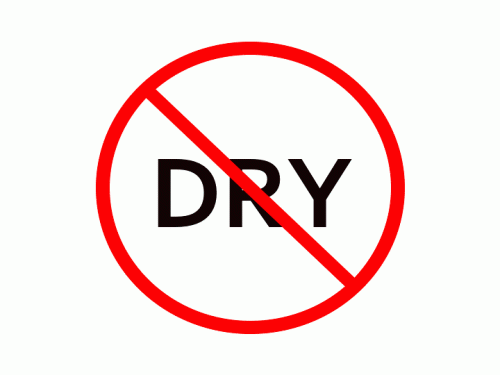This being a manifesto against use of the word “dry” in relationship to wine, I herewith present ten points on why “dry” should be banned from all wine-related speak.
 Some people use “dry” as the opposite of “sweet” in relation to the amount of residual sugar in wine. Wine with no or very little residual sugar is “dry.” Wine with significant (whatever that means) residual sugar is “sweet.” But …
Some people use “dry” as the opposite of “sweet” in relation to the amount of residual sugar in wine. Wine with no or very little residual sugar is “dry.” Wine with significant (whatever that means) residual sugar is “sweet.” But …- Ethanol also tastes sweet, so a high-alcohol wine that is “dry”— that is, that has no residual sugar—can still taste “sweet.”
- Lots of acid can mask residual sugar, so a wine that is “sweet” can still taste “dry.”
- Fruity flavors seem sweet even when they are not associated with sugar (or ethanol, or other sweet substances), so a particularly fruity wine might seem “not too dry” even if it does not have residual sugar and is not high in alcohol.
- Some people also use “dry” to refer to the rough, sandpapery sensations produced by tannins on the inside of the mouth, which has very little to do with residual sugar, ethanol, or fruity flavors.
- Since oak is high in tannins and wine aged in oak picks up tannins from the barrel, some people really mean that they do not like oaky wines when they say that they do not like wine that is “too dry.”
- Some people use the word “dry” as a proxy for “good,” either because they like “dry” wines or because they think that “dry” wines are sophisticated. Some people use the word “dry” as a proxy for “bad,” either because they do not like “dry” wines or because they think that “dry” wines are snobbish. It is confusing.
- If you ask a server either for a “dry” wine or for a wine that is “not too dry,” the server is likely to understand “dry” in exactly the way you did not mean it but, since you used a vague word, you cannot blame the server when you do not like whatever he or she suggests.
- Referring to a beverage as “dry” tends to provoke bad jokes from people who like to take things literally.
10. Referring to a wine as “dry” in the presence of overly-particular wine science geeks tends to provoke long-winded manifestos on why “dry” is a terrible word to use to describe wine.
[author] [author_image timthumb=’on’]http://palatepress.com/wp-content/uploads/2010/07/yoga-headshot-2010-thumb.jpg[/author_image] [author_info]Erika Szymanski was blessed with parents who taught her that wine was part of a good meal, who believed that well-behaved children belonged in tasting rooms with their parents, and who had way too many books. Averting a mid-life crisis in advance, she recently returned to her native Pacific Northwest to study for a PhD in microbial enology at Washington State University. Her goal, apart from someday having goats, is melding a winery job to research on how to improve the success rate of spontaneous ferments. When tending her Brettanomyces leaves enough time, her blog Wine-o-scope keeps notes on why being a wine geek is fun.[/author_info] [/author]

